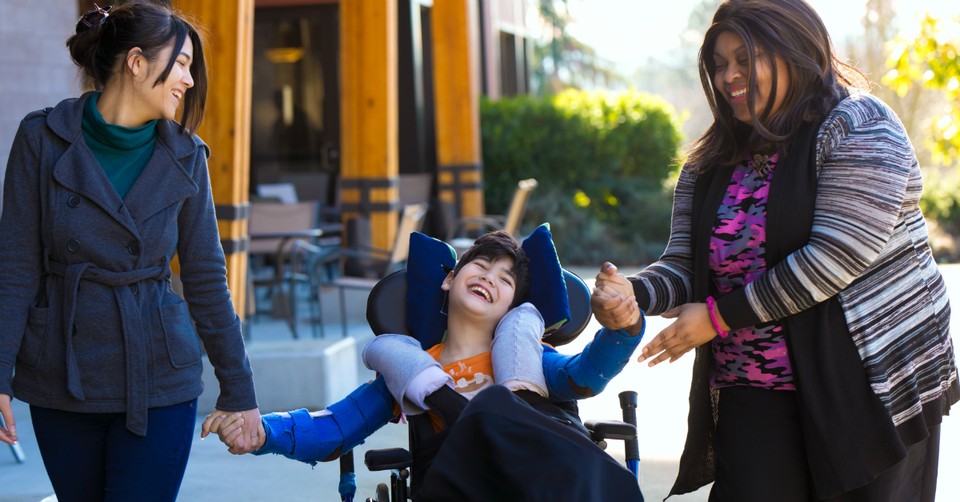11 Ways to Love People with Disabilities

Before my daughter, Alyssa was born with Down syndrome, I had zero experience with intellectual disability. Motivated by fierce mama love, I dove into the deep end and paddled furiously to learn to swim in that world. I admit it was challenging at times, especially to figure out how to relate to my tiny bundle of joy wrapped in so many apparent differences. That’s right, in those days, I focused on the differences.
But people with Down syndrome, and all those with intellectual disabilities (I.D.), want you to know they have more similarities than differences. They want to be appreciated and loved for their value and contributions to society. That’s why I went to the “love chapter” of the Bible—1st Corinthians 13—for wisdom. I found eleven ways to love people with Down Syndrome and other disability diagnoses.
You may be thinking about moving on to another article because you don’t know anyone with an I.D. Please don’t. I encourage you to keep reading. Perhaps God is calling and equipping you to open your heart and life to someone with special needs. Or maybe your child knows someone at school and will need your guidance and support to befriend them. These tips might even come in handy in your “typical” relationships.
God’s Standard of Love
Love is patient and kind. Love is not jealous or boastful or proud or rude. It does not demand its own way. It is not irritable, and it keeps no record of being wronged. It does not rejoice about injustice but rejoices whenever the truth wins out. Love never gives up, never loses faith, is always hopeful, and endures through every circumstance (1 Corinthians 13:4-7 NLT).
God packed so much meaning into each word and phrase of these verses, so we’ll consider it one at a time. I’m going to share candidly in each section from the point of view of not only my daughter but others I know with I.D. Each person is unique, so we can’t stereotype their experiences or perspective. Think instead of the one “speaking” as a composite of various individuals.
Love Is Patient
I may speak or move slower than the rest of the world. I may use electronic technology to communicate. Sometimes I need extra time to process my thoughts. Instead of telling me to hurry to catch up to you, slow down and enjoy life at my pace for a while. You might enjoy it more than your usual speed. Take the time to get to know me, and I will become a forever friend.
And Kind
The kindness of Jesus caused Him to come from heaven to earth in human form. Be like Jesus and intentionally come into my world. Sometimes I may have difficulty initiating interaction, so I grow lonely. Spend time with me. I’m sure you’ll find that we like some of the same things—playing cards, doing puzzles, watching Avenger movies, eating out, and taking walks.
Love Is Not Jealous
Jealousy arises from comparisons, which always leads us to think either too highly or too lowly of ourselves and others. I think people often compare me to those who are “typical” and find me to be “less than.” Some people try to “fix” me so I can fit in. But I’m not broken. Of course, like anyone, I need to learn and grow, but instead of comparing me to other people, please accept and value me as I am.
Or Boastful
When we boast, we build up ourselves. But love builds up other people. Love encourages, helping others to see and achieve their potential—to be their best. I have skills and strengths, as well as spiritual gifts that I may not even fully understand. Like everyone, I appreciate those who notice how I can contribute to my church and community and find ways to include me.
Or Proud
People usually notice there’s something a bit different about me. Sometimes kids feel embarrassed to be friends with me. They risk standing out from the crowd when they spend time with me. I hope parents will teach their children to get to know me. I enjoy many activities that kids do together and long to be included. In the long run, our friendship will benefit everyone.
Or Rude
I try not to notice, but I receive many rude messages about my disability. For the most part, I know that these messages are completely unintentional, so I won’t take offense. But maybe you’d like to know how they can be eliminated. Often, people talk about me as if I’m not in the room, as if I cannot understand. Even if I’m nonverbal, chances are good that I comprehend your words. I like it when people talk directly to me. Sometimes, because I may look different, people stare, or even point. And it’s common to hear the word “retarded” used to describe everything from a dumb idea to people like me to the abuse of puppies. Yes, this word has a clinical meaning that indicates a lower I.Q. Now that it’s commonly used as slang, it feels hurtful. How would you feel if you were labeled with such an unkind word?
Love Does Not Demand its Own Way
Everyone wants to make at least some of their own choices in life. Of course, young kids don’t have much control over decisions, but as they grow and mature, they naturally gain more opportunities for self-determination. I also desire independence, but my choices might be limited. For example, I may not be able to choose to drive, and my work options may be few. Sometimes my life feels completely out of my control. That’s why I appreciate real choices, even small ones, where I don’t always have to follow what someone else wants.
Is Not Irritable
Routines help me to feel secure. Sometimes I will ask over and over what is going to happen. I also might repeat myself when I’m anticipating a coming event or if I desperately want something. Maybe you grow tired of answering the same questions, but I hope you won’t be annoyed with me.
And it Keeps No Record of Being Wronged
Social norms and cues sometimes go over my head. I may not have great executive functioning skills, so sometimes, I commit an etiquette faux pas. That means I might speak impulsively before I have a chance to think much. For example, I used to pat women’s bellies and ask if they were pregnant. I wasn’t implying they were fat; I just hoped they were pregnant because I love babies. But my mom told me their feelings might be hurt. Of course, not everyone with an I.D. has this habit. Whatever the case, just like anyone else, I hope you don’t hold a grudge about these little things.
Love Does Not Rejoice about Injustice but Rejoices Whenever the Truth Wins Out
I’m aware that some people don’t value me. I know that some even think the world would be better off without me living in it. People with those ideas don’t always treat me well. And from the time I was little, I needed special services to grow and develop. There are many barriers to getting what I need to thrive. That’s why I am thankful for advocates—people who will help me to be treated with dignity and voice injustices when they occur.
Love Never Gives Up, Never Loses Faith, Is Always Hopeful, and Endures through Every Circumstance
One of my superhero strengths is persistence. I must work very hard and repeat steps often to learn new skills. It feels exhausting, and I often want to give up. But with a little encouragement, I can take the next step. My parents sometimes grow weary too. We truly cherish those who stick with us in friendship through the ups and downs of life.
Dive in With Me
As a parent, I want you to know how much I welcome anyone with a sincere heart who asks me about Down syndrome or my experiences with Alyssa. Asking shows you care and want to understand.
Perhaps in the past, you’ve hesitated to interact with a person with I.D. because you felt uncomfortable or inadequate about how to love them. I hope you now feel more equipped. I realize, though, that my list doesn’t answer every question. But you don’t need all the answers to open your heart to someone with I.D. Just take the first step in friendship.
I also believe God will be pleased with your attempts to love people with disabilities. In helping His disciples understand what is important in the final judgment, Jesus talked about two groups of people.
One group had fed, clothed, and shown hospitality to disadvantaged people. The other group ignored the needy people. Jesus commended the first group, but He harshly judged those who did not provide what was needed. In fact, Jesus said, “And the King will say, ‘I tell you the truth, when you did it to one of the least of these my brothers and sisters, you were doing it to me!’” (Matthew 25:40 NLT) In other words, when we welcome a person with I.D., we are welcoming Jesus.
Based on my own experiences, I can promise you that your life will be richer and more blessed if you reach beyond your comfort zone to love a person with disabilities.
You can click here to read Annie's personal blog, "55 Cool Facts about People with Down Syndrome." She is also open to answering any questions; you can contact her at annieyorty@gmail.com.

Related Resource: Strengthening Your Marriage While Raising a Child with Disabilities
In this episode of Empowering Homeschool Conversations, your host Annie Yorty and her special guests dive into the unique challenges and beautiful complexities of maintaining a strong, loving partnership while navigating the demands of special needs parenting. Our expert guests bring a wealth of knowledge and personal experience to the table, offering invaluable insights and practical strategies for fostering resilience, connection, and joy in your marriage. Whether you're homeschooling parents seeking support, or simply looking for ways to strengthen your relationship amidst life's challenges, this conversation promises to provide the inspiration and tools you need to thrive together. Listen now!
Originally published April 19, 2022.




